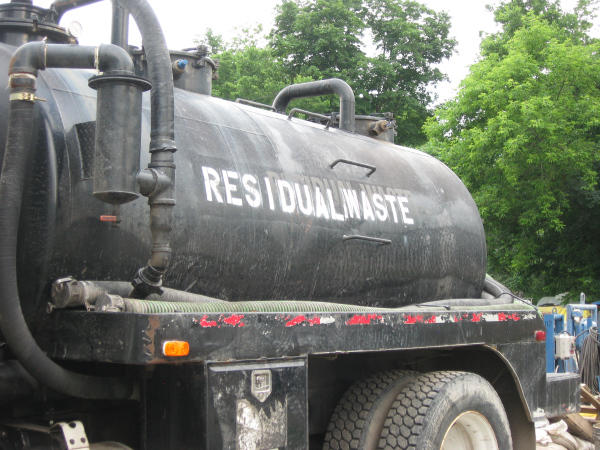Public Comment Required for Fracking Waste Sites

Photo: Iris Marie Bloom
Clean Air Council and its allies achieved a major victory in March in their efforts to ensure that the voices of Pennsylvanians are heard when it comes to fracking and the toxic waste it produces!
While many people know that the fracking industry pollutes the air and water, a lesser-known aspect of the process is how the industry handles and recirculates the toxic liquids fracking generates. When drilling a gas well, several different types of waste liquids need to be disposed of. First, there is “produced water,” which refers to a type of brine that comes up and out of the gas well from underground. Although it is naturally occurring, it is noxious and harmful if mixed with surface or groundwater. Next is “flowback,” which is the liquid that comes back up after being injected into the fracked well. This includes a chemical cocktail of fracking fluids and whatever happens to be picked up deep underground. Drilling fluid waste and other oil and gas liquids wastes also need to be dealt with.
The Pennsylvania Department of Environmental Protection allows gas companies to collect this waste in tanks and pits and then process and reuse it. Though DEP calls this “beneficial use,” the liquid wastes are used to frack more wells — and there is nothing beneficial about that. These dirty operations often spill their toxic waste and rack up violations.
DEP first created a general permitting process for these waste facilities a decade ago. Each permit issued then lasted ten years. As these permits were ready to expire at the close of 2020, the Department revised the general permit. Under the revised plan, the public would have notice of any proposals for waste facilities to be covered under the new permits and an opportunity to provide comments and feedback on those proposals.
However, once DEP finalized the general permit, it went right ahead and issued the approvals for almost all of the fracking waste facilities in Pennsylvania without giving the public a heads-up or opportunity to comment. All of a sudden, 49 facilities had the go-ahead to continue or expand their operations without neighbors or the broader public even having had a chance to review their plans to see if they are flawed or risky.
The environmental community in Pennsylvania came together and demanded that DEP reverse course and allow the public to weigh in on these plans for fracking waste facilities. Following up on that request, the Pittsburgh Post-Gazette on February 10 came out with an editorial calling on DEP to revoke the permits. Although DEP had not opened a comment period, groups still had the opportunity to appeal the permits within 30 days — which was coming up soon. Acting quickly, Clean Air Council joined with its allies to prepare to appeal as many permits as was necessary to ensure that flawed plans for fracking waste facilities would not go forward without scrutiny. The environmental groups and DEP put their heads together for negotiations and, on the eve of the permit appeal deadline, came to an agreement: DEP would provide the public with notice of all 49 permit applications and open up a comment period on all of them. And flaws the public brought to DEP’s attention would be corrected in modifications to the permits. Because the appeal period was closing, the environmental groups could continue ahead with appeals of six of the sites.
This great victory provides the public with the chance to weigh in which had previously been denied. The most recent edition of the Pennsylvania Bulletin announces the 60-day comment period for the waste sites and gives the public instruction on how to submit comments. You can click here and scroll down to “General Permit Coverage for Residual Waste General Permits” to submit your comments today!
Fracking waste storage sites are some of the dirtiest operations around. We’re proud to have been a key part of the effort to ensure that the gas industry didn’t get a pass due to DEP’s mistake. And we’re not done yet: we appealed those six permits, so there’s more fight to come!
For more information, contact Alex Bomstein, Senior Litigation Attorney, at abomstein@cleanair.org

